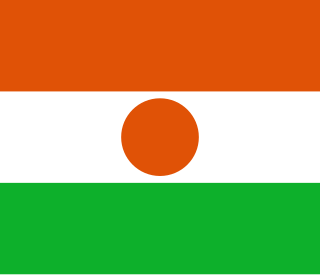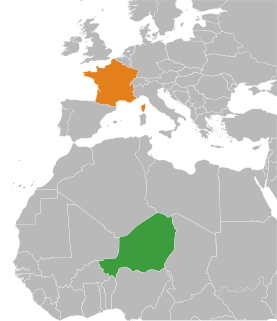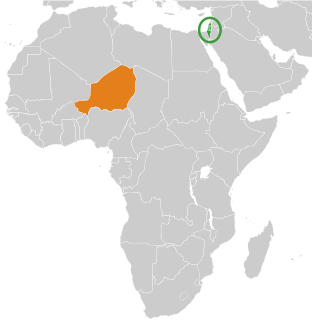Related Research Articles

The unicameral National Assembly is Niger's legislative body. The National Assembly may propose laws and is required to approve all legislation.
Barcourgné Courmo was a Nigerien politician and diplomat. Courmo was Finance Minister and chair of the ruling party politburo in the 1960s, as well as the Foreign Minister of Niger briefly in 1970 under Hamani Diori.
The Cinema of Niger began in the 1940s with the ethnographical documentary of French director Jean Rouch, before growing to become one of the most active national film cultures in Francophone Africa in the 1960s-70s with the work of filmmakers such as Oumarou Ganda, Moustapha Alassane and Gatta Abdourahamne. The industry has slowed somewhat since the 1980s, though films continue to be made in the country, with notable directors of recent decades including Mahamane Bakabe, Inoussa Ousseini, Mariama Hima, Moustapha Diop and Rahmatou Keïta. Unlike neighbouring Nigeria, with its thriving Hausa and English-language film industries, most Nigerien films are made in French with Francophone countries as their major market, whilst action and light entertainment films from Nigeria or dubbed western films fill most Nigerien theatres.

Niger sent five athletes, their second largest contingent ever, equalling the most sports in which they have participated. to compete at the 2008 Summer Olympics in Beijing, China. It was Niger's 10th Olympics; their only medalist has been Issaka Dabore, in boxing, at the 1972 games.

France–Niger relations refer to foreign relations between France and the Niger. Their relations are based on a long shared history and the more than sixty year rule of Niger by the French colonial empire, beginning with the French conquest in 1898. Niger obtained independence from France in 1960, and a history of French influenced culture and French language have been a point of commonality in the creation of a distinctive Nigerien culture from the diverse pre-colonial nationalities which make up modern Niger. France benefited economically from their time as a colonial power, and still relies on imports from Niger for elements of their economy.

There are no formal Bilateral relations between the government of Israel and the Republic of Niger. Diplomatic relations between the countries were active between the independence of Niger in 1960 and 1973. Relations were renormalised in 1996, but terminated by Niger in 2002. There are no special travel or trade restrictions between citizens of the nations.

The Nigerien Action Bloc was a political party in Niger in 1955 and 1956 led by Issoufou Saidou Djermakoye, a traditional chief and former chairman of the Nigerien Progressive Party (PPN).

The Nigerien Progressive Union was a political party in Niger led by Georges Condat.
Issaka Souna is a Nigerien politician has been the Deputy Head of the United Nations Electoral Observation Mission in Burundi since 10 November 2014.
Mariama Hima Yankori is a Nigerien film director, ethnologist and politician. She became the first female Nigerien film director in the 1980s, was State Secretary of Promotion of Women and Protection of Children, and later the first female Nigerien ambassador to France.

Aissa Diori also known as Aïchatou Diori was the wife of Hamani Diori and the First Lady of Niger. She amassed a large wealth through corruption, including high-priced real estate. She was killed in the 1974 Nigerien coup d'état.
Shaïda Zarumey is a Nigerien sociologist and poet, one of the first in her country to write in French.
Fatimata Gandigui Mariko, better known as Fati Mariko, is a Nigerien singer.
Bouli Ali Diallo is a Nigerien academic and activist.
Zara Moussa is a Nigerien singer and rapper, performing under the name ZM.
Hamsou Garba is a Nigerien singer.
Haoua Issa was a Nigerien singer.
Zaley is a musical genre of the Zarma and Songhay people of Niger. Most famous during the 1940s and 1950s, it is a genre dominated by female performers, who take as the subject of their songs the virtues of men whose qualities they appreciated. The word itself comes from the Zarma language, and denotes a blend of musical instruments with female voices; it has also come to mean "amorous seeking". Some writers have described the genre's significance as being similar to that of romanticism in nineteenth-century European culture.
Zalika Souley was a Nigerien actress, the first sub-Saharan movie actress, and one of the pioneering actresses of African cinema.
References
- ↑ Abdourahmane Idrissa; Samuel Decalo (1 June 2012). Historical Dictionary of Niger. Scarecrow Press. pp. 474–. ISBN 978-0-8108-7090-1.
- ↑ Ousseina D. Alidou (14 November 2005). Engaging Modernity: Muslim Women and the Politics of Agency in Postcolonial Niger. Univ of Wisconsin Press. pp. 104–. ISBN 978-0-299-21213-1.